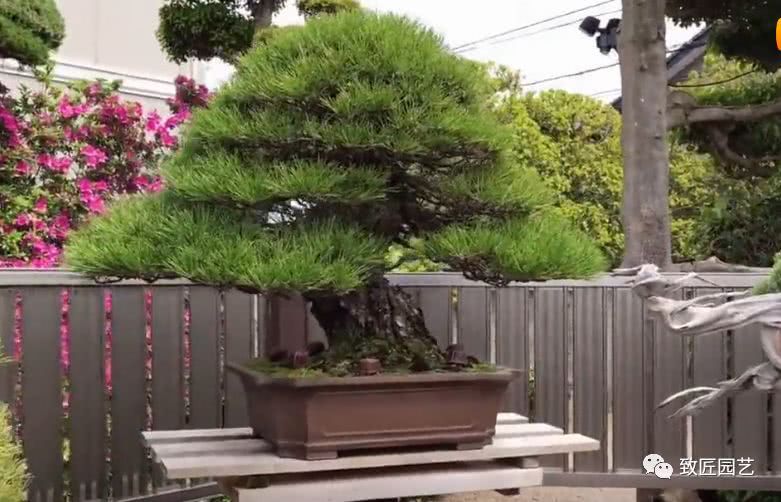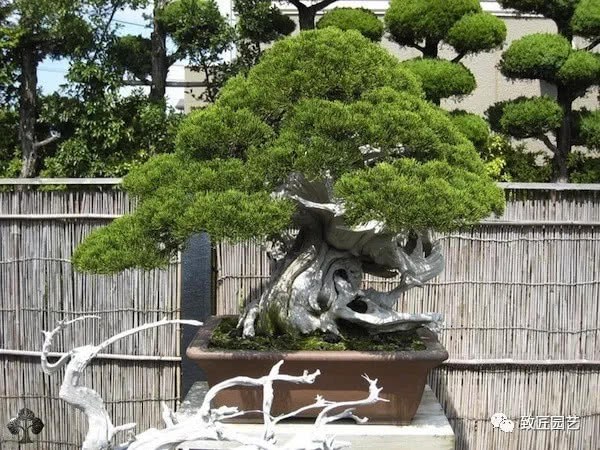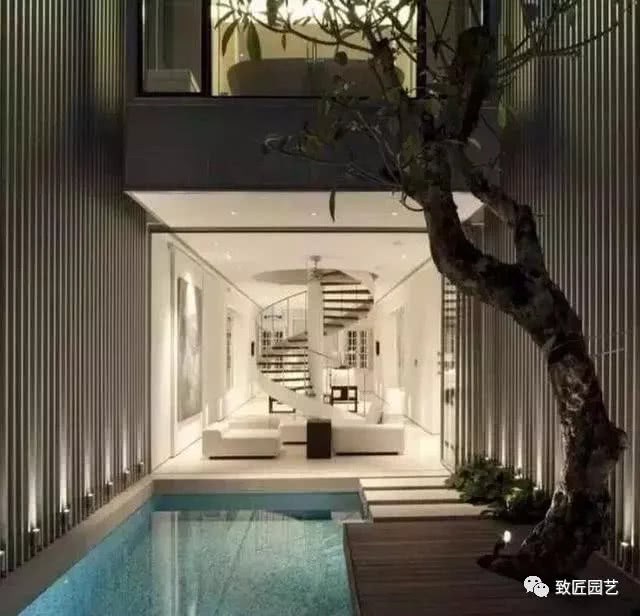On the basis of Chinese bonsai modeling

Interpretation of chapter and method
Zhang method originally refers to the beginning, inheritance and combination of writing articles, and then deduces it into the structural layout of calligraphy and painting. In Chinese bonsai, the rules are used to deal with the relationship between structures, such as care, echo, straightness, density, concentration, situation, rigidity, clumsiness, thickness, weight, increase or decrease, repetition, concession, interspersing, masking, clutch, deformation, realism and leaving blank, polish and damage, etc.
In this paper, it is divided into big chapter and small chapter. In the application of Chinese bonsai art, "big chapter method" can be said to be the "cloth white" of the whole work. Why not use the word "layout" in go, but use the term "cloth white" in calligraphy and painting? We often say that bonsai is a three-dimensional painting. A basin of ounces and a tree of feet can hide heaven and earth. The law of man and earth, the law of heaven, and the law of nature. Bonsai is a popular gadget of the ancient literati, but it has a big story. Laozi said: know the world without going out of the house. The ancient bonsai is the way of the unity of man and nature. A pot of scenery to express one's feelings. This inch basin is painting paper, and the foot tree is pen and ink. The ancients said that the painting was "white when black". This tree is pen and ink, and the empty space in the basin is left blank. How to deal with the relationship between pen and ink and blank space should of course be called "cloth white".
The relationship between trees and pots in Chinese bonsai; the planting location of trees; the size, color, style and texture of pots; laying moss, placing stones, decorating grass, placing pieces, and so on belong to the category of "big rules".
The relationship between root and stem, rod and branch, branch and branch, branch and leaf, whole tree and flower and fruit in Chinese bonsai is called "small chapter method".
I have never seen a bonsai made out of order. Dong Qichang said in the past: "the ancient books take the rules and methods as a major event, and the so-called dense lines are also covered." I see Mi Mi Xiao Kai, "the Collection of the West Garden", is a fan, it is as straight as a string, there must be no other way, but usually pay attention to Zhang Fa er. In the Orchid Pavilion Preface of the right Army, the chapter method is the first in ancient and modern times, and its words are all reflected and born, small or large, as they are at hand, all into the law, so it is a divine product. " Chinese calligraphy and painting have the same meaning as Chinese bonsai.
This article focuses on the "small chapter method", the small chapter method understands, the big chapter method also understands, these two kinds of views are two and one, one and two things.
For every landscape tree, there must be an echo between the big branch and the big branch (the big branch is solved by the big branch), the small branch is settled with the situation between the big branch, the front branch and the back branch reflect each other, and the left branch and the right branch stretch and move. In this way, the spirit of self-energy is smooth, exquisite and harmonious, resulting in the effect of "fine life in the branches and moist air between the leaves".
The whole tree, regardless of the size of the branches, must be consistent in one breath. The performance of the weight, deficiency and reality, density and other relations are appropriate, so that light in heavy, heavy in light, weight balance; there is reality in emptiness, emptiness is seen in reality, virtual and real phase is born; secret in sparse, apparent in density, and appearance in density. For example, the famous generals of ancient times lined up, corresponding to each other from beginning to end, and there are ways to advance and retreat, to gather and disperse, to forbid, and to unify harmoniously. On the other hand, it changes in harmony, gathering in shape without blockage, potential without disorder. The female phase title, the vein of its phase note. According to Laozi's Daojing, "Tao gives birth to one, one to two, two to three, and three to all things." The second is yin and yang, so it is said that "one yin and one yang is the way." The relationship between yin and yang is contrast and unity. The theory of yin and yang is the foundation theory of all traditional disciplines in China. It is also unique to China and belongs to the general guiding theory of Chinese bonsai modeling. Under this guiding theory, the Chinese bonsai, no matter its size, length, distance or proximity, is full of flesh and blood, full of vitality, strong and fat, thin and not disabled. Just like Tiancheng, it is not artificial.
"Wang Xizhi inscribed Mrs. Wei's pen matrix picture" said, "if the shape is straight and similar, if the shape is a word, the top and bottom are flat, and the front and back are flush, it is not a book." This corresponds to the Chinese bonsai, that is, if the landscape tree, each branch is horizontally similar, like an array, regular length, or like a wheel radiating reincarnation, the outline of the tree is a straight line that does not change, it cannot be called bonsai, it is a bonsai. In order to meet each other face to face, branches and branches inherit each other, each has its own state of mind, like a host and guest sitting in a mixture of guests and friends, or like a chorus (Master Lu Xueming's big hand branch is this type of leading singing), one person leads and the voices are in harmony, although there are many but not chaotic. In painting theory, it is called "management position", which is the key to the six methods of painting theory. The branch angle, branch position, branch length, branch vein change and its direction are all arranged, so that the charm is lively and will not be restrained and dull. Although it is necessary to sparse the horse and do not insert a needle, the importance, deficiency and density must contain each other, then the virtual place is not lax, and the real place is not blocked. For example, the window on the white powder wall in the garden is real and empty, so as to "penetrate" and "leak" the sense of "leakage". The planting of flowers and bamboos on the qu Youyou path is virtual and solid, and only then can the interest of "borrowing" and "moving" be obtained. Practice with virtual contrast, make it loose and sparse, the space depends on each other with reality, make it stretch and converge.
Cloth branches are like carrying pens, there are ten taboos and ten advisables.
Ten taboos:
1. Park Jian uses branches to avoid rigidity in straight-pole trees.
2. Avoid slippery branches in soft curved bar trees
3. Clear and sparse trees avoid sloppiness
4. Dense trees avoid clutter
5. Skillful tree bogey
6. Ancient clumsy tree bogey monster
7. the literati are thin and thin.
8. Strong, short, fat, avoid being bloated.
9. Branch type turning point bogey angle
10. The beginning of branches and the ending of branches and veins should be sharp and sharp.
Ten appropriate:
1. Many branches and luxuriant cloth branches should be serene
2. Small and elegant branches of tree cloth should be calm.
3. Hard branches and strong trees should be plump (rigid, medium and soft)
4. Curved branches and soft rods should be strong (soft and strong)
5. Those who have nothing to do with a single branch on the tree are stiff and slightly astringent.
6. Having the same or similar branches should be compact and staggered
7. Branches with changeable turns should be flexible.
8. Horizontal branches or ridge branches that do not change much should be thick
9. If you like to use thin branches, you should use them with great strength.
10. Those who like to use strong branches should use them simply.
Bonsai can be without a few frames, can not be without pots. The pot of bonsai is like the wall of a house, the paper and silk of calligraphy and painting, the side column of printing stone, the rhythm of poetry, and the Lian of go. Where do you plant trees in the basin? Where can I leave it blank? Leave the size of the space, use the round square depth of the basin, especially be careful.
If the tree has the spirit of Shu Kuo Wei and upright spirit, the white beard is big, and if the basin is narrow, then the momentum will be cramped and stiff; if the tree has a compact leaning state, the layout should be small, and if the basin is wide, then the charm will be disbanded. Be sure to make the free part of the pots and trees meaningful and interesting. No haste, no sloppiness, nothing more than sporadic, nothing more than solitude, no repetition. Then this blank has also become the vital pulse of bonsai, and can not be separated. Qingyi Chongguang "painting" cloud: "those who have no level but have level is better, and those who have level but without level are clumsy." Shape into flat, although many hills do not work; look at the depth of people, that is, Shaolin mountains and can play. When the real situation is present, there are many strokes, but the vision is not in the whole picture. The scenery is in the ignorance of the grass, and the taste is endless; when you are good at the scenery, the more new it is. In the dense and distant, the rate is easy to be transferred to Bian Juan. " His words are full of Zen. Especially this sentence, "when the real situation is present, it is not related to many strokes; the vision is not in the whole picture." In the Chinese bonsai, it is regarded as "vision, not scenery and pots." Not in the scene, not in the basin, where is it? Those of us who learn Chinese bonsai should ask ourselves this question.
Stone close at hand, now Wuyue Taihua; a spoonful of water, see thousands of miles of rivers. "A vertical painting of three inches is as high as a thousand feet; a few feet of horizontal ink is the height of a hundred miles of body." Chinese bonsai is a "specific but micro" art with a high degree of refinement and a high degree of generality. The ancients painted landscapes for "lying around". Between lying and playing, the mind can play among the mountains, rivers and lakes in the painting. When we make bonsai, we have the same skill, but we can "lie down and swim" before it is a real bonsai.
The bonsai of "lying tour" is covered with moss and grass. It has several major uses: 1, to cover and protect potted soil (especially trees planted in shallow pots), beautify and avoid erosion of potted soil; 2, use moss to imitate lawn, contrast the height of trees; 3, use different moss to express artistic conception. The moss or the green color is about to drop, or the pale nature gets drunk, but it can be sunny and rainy at 04:00. The method of planting moss or stacking, or tiling, or ups and downs, all arrange the terrain according to the intention. Or decorated with Cuiyun grass, broken copper money, Acorus calamus, iron wire Jue and other flowers (which can also solve the problem of laying too much moss and showing dull monotony). Also like the old plum withered peak, moss gradually dyed, worth its spore, Tess fluttering, up to an inch long Xu, the most worthy of play. However, today's pines and cypresses are mostly used as sherry branches. If they are invaded by moss, they should cover up their colors, wash them clean, and then coat them with stone-sulfur mixture in order to keep them bright. In the bonsai or in the fist stone, there are Xiao Gufeng at the top, like not afraid of Linyuan; there are Xiao Yougou streams, the forest is deep and quiet; there are Xiao Yangtze River lakes, berthing solitary boats and smelling the river; there are Xiao thoroughfares on the road, the road is wide and wide. Or accompanied by strange rocks and strange rocks. The method of placing a stone should not dry up the basin surface and cover it with soil. if there is a root growing from the soil, it is called buried stone. The most important thing to bury a stone is to expose the roots of a tree. This is where the confession comes. It is called letting go of kungfu when placing furnishings such as a ruler. The decoration of the bonsai is like painting the eye of the dragon, if the dragon has the eye, it does not need to be pointed. Therefore, the decoration is based on the intention to determine whether to adopt it or not. Bonsai furnishings or buildings or houses, or pavilions or pavilions, or bridges or boats, or lying oxen or drinking horses, or holding the altar of the old man, or playing the piano Lishu, or scroll scholar, or load woodcutter, or tattooing game, or bamboo horse hee, when used in conjunction with the bonsai title, for the spirit of a basin. The stone carvings are best for the above, the ceramic products can be purchased by the middle, and the metal and plastic products are the most unusable and lifeless.
Bonsai with several methods, the high (sign tube with high stool), the rich Yu Kuo (low case set shallow plate), the clumsier (natural bonsai log pad), generally like this. Several frames of wood, most hardwood (with its texture smooth and beautiful texture natural). There are mortise line carvings, log saw blades, natural root splicing, rare stone and rarely used porcelain. Other materials are unbearable to use.
The rules of Chinese bonsai pay attention to the order of guests and guests. Take bonsai trees as an example, Jingshu is the main one, other plants are covered with moss and grass, stone furnishings are arranged, and several pots are all guests, and guests must not win over the host. Most people who make bonsai must have their own ideas in mind. This is called "having me". Do not have their own views, views, design plans, think of where to do, that is the means of tinkers, the result of the whole basin of things, do not take care of each other, is the biggest taboo, how can we do good things? Take the momentum of the set, the most important thing is to look at the overall situation, to have the feeling of getting things done in one go. If you look at it carefully, you can see that the magic, mechanics and methods are all in harmony. The idea is expensive "unexpected, care about reasonable." The road is clear, from near high to far low; the scenery is prepared, from light simplicity to preparation. When you have a scene in your chest, you can make a tree; if you have a boundary in your mind, you can decide the source. The context and the layout should be explained clearly and clearly. Flying eaves in the mountains can tell the view of the building; red apricots outside the wall must be a garden. There must be foreshadowing in the exhibition, not without beginning and end. The hidden place is full of content, so it must be fully calculated.
The means of the sages, in the extremely dense practice, you can see some emptiness; in the extremely empty place, you can read a lot of content. Today, people decorate a corner of the basin and have seen a lot of trouble. The reality is full of intelligence, and the reality is full of vitality. Those masterpieces that have been handed down for a long time never get tired of playing, and you can imagine the beauty of the miserable management of the sages. The layout of the rules and regulations is only the word "miserable operation". (end of the previous article)
Wonderful content
- Prev

See if the bonsai making techniques of foreign boys are amateur.
Do you like this article? Share it now and let more people know! The content of this site is rich, extensive and profound.
- Next

The waterscape of the courtyard is full of spirit.
The courtyard is not the size, there is water, there is aura, these courtyard water features, which one do you like? The wonderful content likes this article.
Related
- Wuhan Hospital Iron Tree Blooming Result Was Instantly Frightened by the Gardener Master
- Which variety of camellia is the most fragrant and best? Which one do you like best?
- What is the small blue coat, the breeding methods and matters needing attention of the succulent plant
- Dormancy time and maintenance management of succulent plants during dormancy
- Minas succulent how to raise, Minas succulent plant pictures
- What are the varieties of winter succulent plants
- How to raise succulent plants in twelve rolls? let's take a look at some experience of breeding twelve rolls.
- Attention should be paid to water control for succulent plants during dormant period (winter and summer)
- Watering experience of twelve rolls of succulent plants
- Techniques for fertilizing succulent plants. An article will let you know how to fertilize succulent plants.

